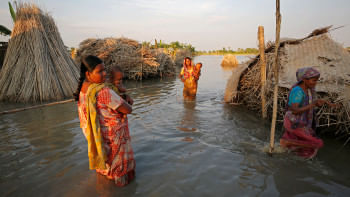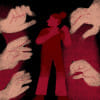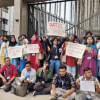The role of state and society in sustaining gendered violence

Let us call a spade a spade: rape persists in Bangladesh at the scale it does because too many men believe they are superior beings and that women exist to be controlled. The ongoing rape epidemic, shaped by decades of social conditioning, is not an issue of immorality or individual misconduct. A state-society relationship that, by design, entrenches male dominance and denies women agency has allowed violence against women to continue unabated, regardless of who is steering the ship of state.
A woman's rights to safety, dignity, and autonomy are fundamental human rights—not abstract concepts that fell from the sky—guaranteed under all layers of law that Bangladesh has signed up to: criminal and constitutional law on the domestic front, as well as international legal covenants. Rape is neither an act of impulse nor a crime driven by desire. It is a calculated display of power and a deliberate instrument of oppression, upheld by the trio of society, political entities, and the state apparatus—each of which, whether willingly or inadvertently, has, since independence, served to protect perpetrators and silence victims. Bangladesh must acknowledge this reality if it intends to course-correct.
An ingrained patriarchal ideology sustains Bangladesh's rape culture, emanating from spaces that must be called out with conviction: right-wing conservatism and some flawed religious interpretations. The implicit justification of sexual violence as a woman's problem, particularly in religious societies, is tied to a distorted interpretation of Abrahamic teachings by individuals who claim religious authority or moral high ground. Sadly, many of their followers are moulded by this so-called guidance. The fraudsters claiming to be religious teachers have long excused or sought to minimise male violence while imposing endless restrictions on women in the name of faith.
Religious scripture is not the central issue in this discussion—much has been said about what Islam, for example, says about rape and the dignity it affords women. Religious law indeed prescribes the harshest punishment for rapists. However, what matters here and now is how religion is weaponised by some followers. The most vocal proponents of gendered subjugation—sometimes subtly, other times overtly, as seen in recent days—are often right-wing scholars and self-proclaimed religious adherents. These are the same individuals who insist that rape, or any act of violence against women, is the fault of women rather than the men who commit it.
A society that polices women while absolving men of accountability ensures that rape culture remains embedded in daily life. The notion that a woman's attire, movements, or mere presence dictates her risk of being raped is a convenient falsehood designed to shield perpetrators from blame. This deliberate misdirection has allowed sexual violence to prevail while large segments of public discourse—and increasingly, a toxic social media—obsess over what victims could have done differently instead of confronting the real issue: why rapists act with such impunity.
Evidence obliterates these excuses. Women in full-length traditional clothing are raped. Madrasah students, covered from head to toe, are raped. Eight-year-old children, with no understanding of sexuality, are raped. Young girls are gang-raped as acts of vengeance against their relatives. Mothers are raped while their children watch in horror. The illusion that staying indoors after dusk ensures safety is another cruel lie. Women are raped behind locked doors in spaces presumed secure. Many are assaulted by their spouses—they are treated as marital property rather than as human beings with rights. Some are attacked in their bedrooms by rapists who force their way in, others brutalised in front of their families. This is Bangladesh.
They are not targeted because of their choices of clothing or actions but simply because, in the minds of rapists, they are accessible prey in a system that fosters male entitlement and treats female suffering as collateral damage. The narrative that modesty or seclusion offers protection collapses in the face of the relentless, lived reality of women. Let us be clear on this: sexual violence does not stem from uncontrollable desire or momentary lapses in restraint. It has always been an assertion of supremacy, an act of degradation, and, importantly, an egregious crime—one that, by law in Bangladesh, can carry capital punishment, meaning the death penalty.
The failures of the state are not accidental. They are structural. Laws exist on paper, but the legal system has continually failed to establish precedent-setting punishments that could serve as deterrents. The police do not act to the extent required. The courts do not convict. The justice system has repeatedly shielded perpetrators while offering little to survivors. When a system allows rapists to walk free and forces victims into silence, it is not just failing—it is complicit. Even citizens who claim neutrality—the ones who insist that both sides have valid points—are enablers. Rape culture is not only built by rapists—it is sustained by those who stay silent.
Over the years, state institutions have not simply ignored sexual violence, they have facilitated it. Survivors hesitate to report rape because the default response by law enforcement, and at times their own community, family, and friends, is to scrutinise the victim. She is interrogated about what she wore, where she was, whom she was with, and why she was there. Her choices are dissected while the rapist's actions are excused as instinct or impulse. This is not the failure of a few bad apples or a particular government, political, military, or technocratic. It is the outcome of state-society relations designed to uphold male supremacy in every sphere of day-to-day life and within public interactions.
The solution does not lie in caution, restraint, or so-called modesty. Parents must teach their sons that they have no divine power over girls. The education system must stop producing young men who believe they have dominion over women. The justice system must strip rapists of the impunity they enjoy. The state must abandon its indifference and act with ruthless, inescapable severity. If there is ever a case for the state as the sole authority to exercise legitimate force, it is in declaring and implementing a war against sexual violence. The reactionary forces that sustain rape culture must be confronted, exposed, and dismantled.
To achieve this, society, political entities, and the state apparatus must work in tandem. There is no alternative to this. Doing so requires both bottom-up and top-down efforts, serious political will, and carefully designed public education campaigns tailored to both rural and urban Bangladesh. It will take time, but it must start immediately and rigorously. Crucially, now is a fitting moment—Bangladesh has made it clear that it is willing to reset. And that reset cannot sideline the fact that women in Bangladesh fear backlash and violence for being, well, women.
The statistics on rape are frightening, to say the least. From 2012 to 2018, an average of roughly 1,000 rapes were reported per year, according to an analysis conducted by Ain o Salish Kendra. Then, from 2018 to 2020, there was a 122 percent increase from 2017. Bangladesh Police indicate even graver statistics: over the past five years, more than 27,000 cases of rape and nearly 60,000 cases of violence against women have been filed. These numbers are likely far higher due to severe underreporting. The conviction rate for rapists is less than two percent.
Post the mass uprising, amid a shattered state machinery and the interim government's subsequent difficulties in establishing law and order, visible cases of violence against women have sparked concern, and rightly so. While the interim government has taken some, albeit reactive, steps, far more on the policy, communication, and political fronts is required—not only from the government but from mainstream political parties, educational institutions, community leaders, business elites, and society at large. Religious scholars, too, must recognise the role they play as opinion-makers. As such, they must conduct themselves and speak in ways that do not promote anti-women rhetoric or sexism.
Obscene comments about clothing or provocation only serve to distract from the real problem. Too many men are raised, often by their own families, with a rooted mindset that perceives women as weak and subordinate rather than as equal, dignified human beings. They view women as objects of consumption, not as individuals deserving of respect. If a man feels physically or sexually excited and decides to commit a criminal act, that is not the woman's problem—it is his. It stems from his lack of self-control, his ignorance, his inability to see women as equals, and a complete absence of rationality, compassion, and empathy.
It is a shared national responsibility—yours, mine, and the state's—to deliver a harsh and unequivocal message to these men, the perpetrators, and the enablers: no more leniency. No more impunity. No more silence. Bangladesh must stand by the activists and citizens fighting the good fight and demanding justice for rape victims in the streets of Dhaka and beyond.
Mir Aftabuddin Ahmed is a public policy columnist. He can be reached at [email protected].
Views expressed in this article are the author's own.
Follow The Daily Star Opinion on Facebook for the latest opinions, commentaries and analyses by experts and professionals. To contribute your article or letter to The Daily Star Opinion, see our guidelines for submission.

 For all latest news, follow The Daily Star's Google News channel.
For all latest news, follow The Daily Star's Google News channel. 










Comments